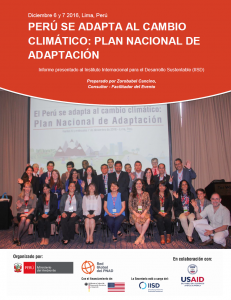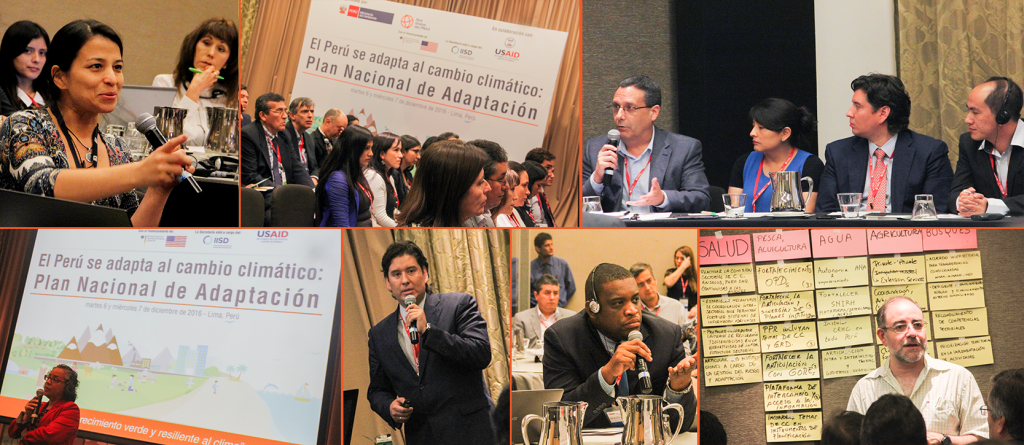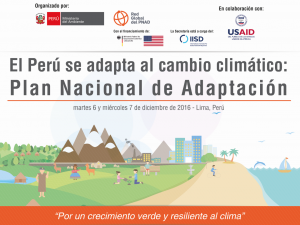
Lea el reporte del evento “El Perú se Adapta al Cambio Climático: Plan Nacional de Adaptación.”
Lima, 5 de diciembre de 2016.- Con el objetivo de articular a todos los sectores y actores del país en la puesta en marcha del Plan Nacional de Adaptación ante el cambio climático, el Ministerio del Ambiente del Perú y la Red Global de Planes Nacionales de Adaptación organizaron en Lima, y por primera vez en Latinoamérica, el taller internacional denominado “El Perú se Adapta al Cambio Climático: Plan Nacional de Adaptación”. El evento se llevó a cabo los días 6 y 7 de diciembre de 2016, congregando a expertos nacionales e internacionales para fomentar la implementación del Plan de manera eficiente, participativa y articulada.
El Perú posee una diversidad de recursos y servicios ecosistémicos que se ven seriamente amenazados por el cambio climático. Algunos de sus efectos son claramente visibles como es el caso de la pérdida y retroceso de glaciares, dificultades para el acceso a recursos hídricos, mayores y más prolongadas sequías, incendios forestales, heladas e inundaciones. En ese contexto, es tiempo de adaptarnos al cambio climático con eficacia.
Por ello, el Plan Nacional de Adaptación forma parte de las Contribuciones Nacionalmente Determinadas (NDC) que el Perú reporta a la Convención Marco de las Naciones Unidas sobre el Cambio Climático (CMNUCC) y en las cuales ha asumido el compromiso de trabajar la adaptación en 5 áreas temáticas priorizadas: agua, agricultura, pesca y acuicultura, bosques y salud. La meta es clara: un Perú resiliente al clima.

Reducir la vulnerabilidad ante los impactos negativos del cambio climático y capitalizar sus impactos positivos son parte de las tareas del Plan Nacional de Adaptación. Un primer paso para es el modelo de gestión intersectorial que ya implementa con éxito. En ese sentido, participarán del evento miembros del Grupo de Trabajo Multisectorial encargado de generar información técnica para orientar la implementación de las NDC en el país.
En el evento estuvieron también presentes miembros del Grupo de Trabajo Técnico de Gestión de Riesgos Climáticos de la Comisión Nacional sobre Cambio Climático, representantes de la sociedad civil, e instituciones públicas. Junto a ellos, expertos internacionales de Camboya, Canadá, Colombia, Granada y Estados Unidos compartieron sus experiencias en financiamiento, monitoreo y evaluación, y comunicación del Plan Nacional de Adaptación.
La Red Global de Planes Nacionales de Adaptación (NAP GN) fue fundada en Lima, Perú, en diciembre del 2014 durante la Vigésima Conferencia de las Partes (COP20) con apoyo financiero inicial de Alemania y Estados Unidos. La NAP GN se formó para fortalecer el diseño e implementación planes nacionales, facilitar el aprendizaje continuo entre pares, e incrementar el apoyo bilateral para la adaptación en países en desarrollo. La Secretaría de la Red está a cargo del Instituto Internacional para el Desarrollo Sustentable (IISD) de Canadá.
La implementación del Acuerdo de París para un crecimiento verde del país es una prioridad que nos compromete a todos y el Plan Nacional de Adaptación es una valiosa oportunidad para ello. Este evento puso de manifiesto cómo la armonía entre el desarrollo económico y la adaptación al clima aporta beneficios y compromisos con el ambiente para todos los peruanos.

Peru Hosts International Workshop on the Advances and Challenges of the National Adaptation Plan for Climate Change
Lima, December 5, 2016.– With the objective of coordinating all sectors and actors in the country in the implementation of the National Adaptation Plan for Climate Change, Peru’s Ministry of Environment and the National Adaptation Plan Global Network organized in Lima—for the first time in Latin America—the international workshop called “Peru Adapts to Climate Change: National Adaptation Plan.” The event was held from December 6-7 2016, bringing together national and international experts to promote the implementation of the Plan in an efficient, participatory and articulated manner.
Peru has a range of ecosystem resources and services that are seriously threatened by climate change. Some of its effects are clearly visible, such as the loss and retreat of glaciers, difficulties in access to water resources, greater and more prolonged droughts, forest fires, frosts and floods. In that context, it is time to adapt to climate change effectively.
Therefore, the National Adaptation Plan is part of the Nationally Determined Contributions (NDC) that Peru reports to the United Nations Framework Convention on Climate Change (UNFCCC) and in which it has undertaken to work on adaptation in 5 prioritized thematic areas: water, agriculture, fisheries and aquaculture, forests and health. The goal is clear: a climate resilient Peru.
Reducing vulnerability to the negative impacts of climate change and capitalizing on its positive impacts are part of the tasks of the National Adaptation Plan. A first step is the intersectoral management model that is already successfully implemented. In that sense, members of the Multisectoral Working Group in charge of generating technical information to guide the implementation of NDCs in the country also participated in the event.
Participants also included members of the Technical Working Group on Climate Risk Management from the National Commission on Climate Change, representatives of civil society, and public institutions. Along with them, international experts from Cambodia, Canada, Colombia, Grenada and the United States shared their experiences in funding, monitoring and evaluation, and communication of the National Adaptation Plan.
The National Adaptation Plan Global Network (NAP GN) was established in Lima, Peru, in December 2014 during the Twentieth Conference of the Parties (COP 20) with initial financial support from Germany and the United States. The NAP GN was created to strengthen the design and implementation of National Adaptation Plans, facilitate peer learning and to increase bilateral support for adaptation in developing countries. The Network’s secretariat is the International Institute for Sustainable Development (IISD), based in Canada.
The implementation of the Paris Agreement for green growth in all countries, and the National Adaptation Plan is a valuable opportunity for this. This event highlighted how the harmony between economic development and climate adaptation brings benefits and environmental commitments for all Peruvians.